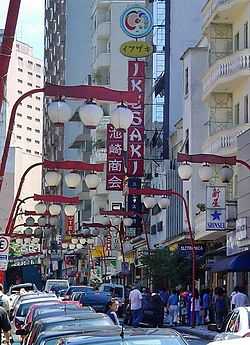Liberdade (district of São Paulo)
| Liberdade | |
|---|---|
 Location in the city of São Paulo | |
 | |
| Country | Brazil |
| State | São Paulo |
| City | São Paulo |
| Subprefecture | Sé |
| Government | |
| • Type | Subprefecture |
| Area | |
| • Total | 3.7 km2 (1.4 sq mi) |
| Population (2000) | |
| • Total | 61,875 |
| • Density | 16,723/km2 (43,310/sq mi) |
| HDI | 0.936 –high |
| Website | Subprefecture of Sé |
Liberdade (リベルダージ Riberudāji, Portuguese pronunciation: [libeɾˈdadʒi], Portuguese for "Liberty", "Freedom") is the name of a district in the subprefecture of Sé, in São Paulo, Brazil. It is home to the largest Japanese community outside of Japan in the world.
Overview
Liberdade is São Paulo's own equivalent of Japantown in the USA. The overall Japanese Brazilian population is declining, secondary to a decreased birth rate and an aging population; return immigration to Japan,[1][2][3] as well as intermarriage with other races and dilution of ethnic identity. However, significant populations of Chinese and Koreans also live in the district of Liberdade. It is served by the São Paulo Metro.

The entrance to Liberdade is marked by a nine-meter tall red torii (a Japanese arch that marks the entrance to Shinto temples) since 1974. This towering structure, situated on Rua Galvão Bueno, is a distinctive representation of the neighborhood. Liberdade was successfully connected to the São Paulo subway network in the 1970s, opening up this area to commerce like never before. Today, thousands of paulistanos (citizens of São Paulo) flock to the public square in Liberdade every Sunday to purchase craft goods at the weekly fair. In January 2008, in order to celebrate 100 years of Japanese immigration to Brazil, a project to revitalize the quarter was approved by the mayor Gilberto Kassab. 40% of the restoration were for the visit of the prince Naruhito to São Paulo in June 2008.
The Japanese presence in the neighborhood began in 1912. At this time, Japanese immigrants began to take up residence on the street of Count Sarzedas. This street had a steep slope that gave way to a running stream and swamp area. Basement apartments were numerous and inexpensive, and groups of people or families often lived together in the small rooms. However, the central location of the neighborhood meant immigrants could also be closer to work. As the number of immigrants in the neighborhood grew, so did commercial activity. Soon Japanese-owned inns, emporiums, restaurants, shops, and markets were popping up. These new commercial endeavors also become workplaces, which brought more immigrants to the area, and thus the "street of the Japanese" was formed.
Liberdade is a meeting spot for many groups, especially among young people who are interested in Japanese culture. Manga (Japanese comics) fans, sometimes participating in cosplay, can be seen in the district almost any day of the week, especially on weekends. The district is also a popular tourist destination. People from all over the world, as well as from Brazil itself, are often seen mixing with the Japanese housewives doing their grocery shopping on Galvão Bueno Street and businessmen looking for low priced Asian food for lunch. Most popular is Liberdade street market that occurs each Saturday and Sunday. Offering tastes of traditional Japanese food and various goods, this well-known event attracts so many people from outside of Japan Town that the event is predominantly non-Asian.
Media
The Japanese newspaper São Paulo Shimbun is published in Liberdade.[4]
The Japanese newspaper Nikkey Shimbun and its sister Portuguese paper the Jornal Nippak are published in Liberdade.[5][6]
Culture and recreation
The Museu Histórico da Imigração Japonesa no Brasil (ブラジル日本移民史料館) is located in Liberdade.[7]
See also
References
- ↑ Naoto Higuchi (27 February 2006). "BRAZILIAN MIGRATION TO JAPAN TRENDS, MODALITIES AND IMPACT" (PDF). United Nations. Retrieved February 21, 2015.
- ↑ Richard Gunde (January 27, 2004). "Japanese Brazilian Return Migration and the Making of Japan's Newest Immigrant Minority". © 2013. The Regents of the University of California. All rights reserved. Retrieved February 21, 2015.
- ↑ Naoto Higuchi and Kiyoto Tanno (2003). "What's Driving Brazil-Japan Migration? The Making and Remaking of the Brazilian Niche in Japan" (PDF). International Journal of Japanese Sociology. Retrieved February 21, 2015.
- ↑ "Contato." São Paulo Shimbun. Retrieved on March 17, 2014. "Jornal São Paulo Shimbun - Rua Mituto Mizumoto, 255 - Liberdade - São Paulo - SP"
- ↑ "ホーム. Nikkey Shimbun. Retrieved on 17 March 2014. "RUA DA GLORIA, 326, LIBERDADE CEP 01510-000, SAO PAULO - SP, BRASIL"
- ↑ Home page. Jornal Nippak. Retrieved on 17 March 2014. "Rua da Glória, 332 - Liberdade - São Paulo - SP"
- ↑ "Home." Museu Histórico da Imigração Japonesa no Brasil. Retrieved on March 19, 2014. "Rua: Joaquim, 381 - Liberdade - Cep: 01508-900 - São Paulo - SP"
Coordinates: 23°34′04″S 46°37′46″W / 23.5677777878°S 46.6294444544°W
| ||||||||||||||||||||||||||||||
